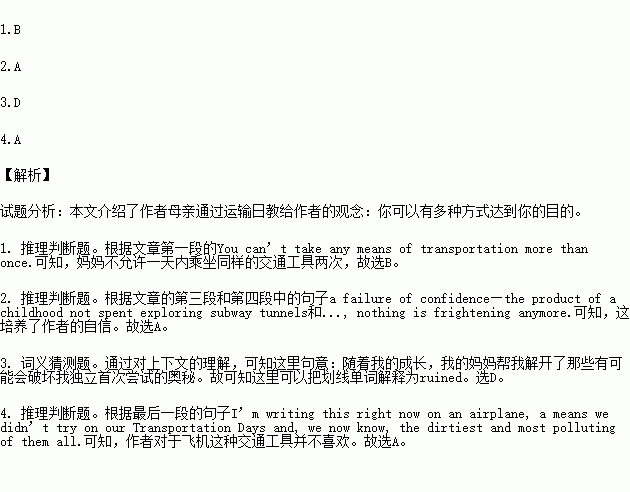题目内容
When my brother and I were young, my mom would take us on Transportation Days.
It goes like this: You can’t take any means of transportation more than once. We would start from home, walking two blocks to the rail station. We’d take the train into the city center, then a bus, switching to the tram, then maybe a taxi. We always considered taking a horse carriage in the historic district, but we didn’t like the way the horses were treated, so we never did. At the end of the day, we took the subway to our closest station, where Mom’s friend was waiting to give us a ride home — our first car ride of the day.
The good thing about Transportation Days is not only that Mom taught us how to get around. She was born to be multimodal(多方式的). She understood that depending on cars only was a failure of imagination and, above all, a failure of confidence — the product of a childhood not spent exploring subway tunnels.
Once you learn the route map and step with certainty over the gap between the train and the platform, nothing is frightening anymore. New cities are just light-rail lines to be explored. And your personal car, if you have one, becomes just one more tool in the toolbox — and often an inadequate one, limiting both your mobility and your wallet.
On Transportation Days, we might stop for lunch on Chestnut Street or buy a new book or toy, but the transportation was the point. First, it was exciting enough to watch the world speed by from the train window. As I got older, my mom helped me unlock the mysteries that would otherwise have paralyzed my first attempts to do it myself: How do I know where to get off? How do I know how much it costs? How do I know when I need tickets, and where to get them? What track, what line, which direction, where’s the stop, and will I get wet when we go under the river?
I’m writing this right now on an airplane, a means we didn’t try on our Transportation Days and, we now know, the dirtiest and most polluting of them all. My flight routed me through Philadelphia. My multimodal mom met me for dinner in the airport. She took a train to meet me.
1.Which was forbidden by Mom on Transportation Days?
A. Having a car ride.
B. Taking the train twice.
C. Buying more than one toy.
D. Touring the historic district.
2.According to the writer, what was the greatest benefit of his Transportation Days?
A. Building confidence in himself.
B. Reducing his use of private cars.
C. Developing his sense of direction.
D. Giving his knowledge about vehicles.
3.The underlined word "paralyzed" (in Para. 5) is closest in meaning to "________".
A. displayedB. justifiedC. ignoredD. ruined
4.Which means of transportation does the writer probably disapprove of?
A. Airplane.B. Subway.C. Tram.D. Car.
 课堂全解字词句段篇章系列答案
课堂全解字词句段篇章系列答案
